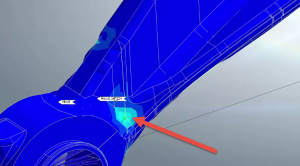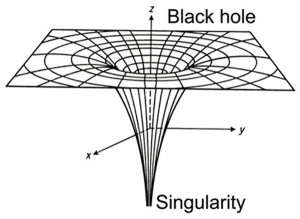That FEA problem used to drive me mad
It happened to me a countless number of times.
I had just finished to set up my FEA model and run the analysis and I knew more or less what range of stresses I wanted to find.
I was waiting for the results to confirm that…
BUT…As you know there is always a factor between le results you expect and what you actually get… that’s normal in FEA.
…but why was the error so big???
I was looking at the maximum Von Mises Stress and I realized the average values inside the model were more or less OK, but I was just getting a small red point that was changing everything.
Inside this red area, the “normal” von mises stresses were 3 or 4 times the expected value and it clearly indicated that there was a big problem in my model…

So what did I do?
Of course, I started to search on the Internet! 🙂
And I found I was not alone to have such a problem… in fact, this problem was very common.
It was a singularity.
A “SINGULARITY” !!
This word sounds like coming right from Star Trek…
Do you know what is a singularity?
You see the image below?
Well…a singularity is basically the same… but inside your FE model!

Now I knew what it was…a singularity… but I still knew nothing.
The very famous physicist Richard Feynman said something I always remember:
“Even if you know the name of a bird in hundred languages, you still know nothing about the bird.”
So I decided to learn more about singularities and by what they were caused.
But, maybe before I explain that, you are wondering why singularities are such a pain in your model??
After all…I didn’t discuss that
Why is a single singularity in your model such a pain?
Well, singularities are causing many problems, but the major ones are:
– They cause an accuracy problem inside your model near the singularity.
– They cause a problem of visualization of your results by extending the range of the color inside your legend.
Those 2 problems are very painful…and that’s why I was wondering what ultimately causes singularities.
What causes a singularity
At first, I searched the answer on the Internet, but I couldn’t find it.
(I always thought that all the answers were available on the Internet for free, but that’s really not true)
Finally, I had to ask someone more expert than me about this topic to understand finally what was the major cause of singularities.
And it was …boundary conditions!
I didn’t want to believe it at first, but when I modified a bit the boundary conditions of my model, I discovered that the singularity vanished immediately.
Who knew that boundary conditions had such an impact…
Since then, I made a lot and a lot of progress (this situation I described happened 6 years ago when I just started to use FEA seriously)
I understood that there are a lot of ways to tackle singularity problems and also to set up boundary conditions so you will never get singularities…but that really took a lot of time to understand and a lot of efforts.
Maybe I’ll do some short course about it to explain all that in real details to you. That will save you a lot of time for sure.
Ok, it’s already late here… I’ll write more in a next article.
Just tell me:
Would you like to learn more about this topic?
Let me know by writing a comment
